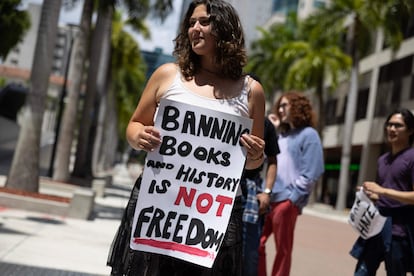Book bans reach all-time record in the US
In 2022 libraries recorded requests to withdraw 2,571 titles, twice as many as in the previous year. Florida has laws that specify jail terms of up to five years for teachers and librarians who bypass bans


Brian Covey says he did not set out to become a symbol of the resistance to the United States book bans, a phenomenon that has set yet another all-time record. But that is what happened. Last January he posted a video on his Twitter account, in which he gave vent to his passion, above all, for the Jacksonville Jaguars NFL team. The footage, which went viral, showed empty bookshelves in the library of a middle school in Duval County, Florida. Visiting Jacksonville, the state’s biggest city, a local reporter asked Governor Ron DeSantis about the 17-second tracking shot: He dismissed it as a “false narrative.” The next day, Covey received a call from the company that had hired him as a substitute teacher at another school in the district. “We will no longer require your services,” he was told.
That put an end to Covey’s plans to become a teacher; he had previously worked in finance. In a telephone interview with EL PAÍS on Monday, he was adamant that when he uploaded the video he was not acting as a teacher, but as the father of his two children, aged seven and 10, who are students in Duval County school district. “They are suffering a full-fledged attack on public education,” he said.

The conservative book ban has become part of the American landscape since the pandemic, when parents across the country who were home schooling their children, took a look at what they were required to read, and launched a crusade to “question” the curriculum. It is a movement that has taken hold across the country, at the same pace as the increase in political polarization, but, as is now the norm on the multiple fronts of the “culture war,” it is being waged with particular viciousness in Florida.
DeSantis has made the issue a priority and a trump card in his more than likely run for the White House in 2024. Although his campaign may be in the doldrums, DeSantis seems the only candidate capable of standing up to Donald Trump. His plan aims to apply his particular conservative instruction manual throughout the country. The idea is, as its slogan says, is to “Make America Florida.”
The state has passed three education laws, which, among other things, prohibit instilling a sense of guilt in students for the actions of their ancestors (to bury critical race theory) and outlaw classroom talk about sexual orientation and gender identity. This ban, which its critics call “Don’t Say Gay,” is about to be extended to include students up to age 18. These laws are vaguely worded, but, because they carry penalties of up to five years in prison or the withdrawal of a license to practice, Florida teachers and librarians would rather remove books or cover shelves to hide them from students’ view than risk committing a crime. “Sometimes they do it proactively, without any prior request,” laments the recently released report Banned in the USA by Pen America, a free speech advocacy group.
Since y'all wanna play the "this isn't really happening" game https://t.co/bVUFOXPc6a pic.twitter.com/fUUkJgi5ls
— JagsFanBrian✊🏿✊🏽✊ (@JagsFanBrian) January 27, 2023
Those rules also offload the purview of what is appropriate for children to read onto the state’s 67 counties. Not all have taken it as seriously as Duval, whose officials have removed about 1.5 million titles while a group of “certified media specialists review all books in school sites and classroom libraries,” according to a statement from the school district. The team of reviewers is made up of 52 people. As of April 6, they had been given time to examine 24,972 titles. Covey estimates that at that rate it will take them “56 years to finish their homework” and that, in the meantime, his two children will be impacted in “their reading comprehension levels. They’ve cut out their reading time, and instead invite them to play quietly in the classroom,” he says.
Among the nearly 25,000 titles reviewed, only 21 did not make the cut, including Diana Gabaldon’s bestseller Forastera and Nobel laureate Toni Morrison’s novels Blue Eyes and Beloved.
Morrison is a regular on the list of “most challenged” books in the United States, published each year by the American Library Association (ALA). The 2022 edition, unveiled last week, is once again headed by the autobiographical comic Gender Queer, by Maia Kobabe, a non-binary gender cartoonist (removal of their book had been requested 151 times). They are followed by All Boys Aren’t Blue, by George M. Johnson, another ode to sexual diversity (requested for removal 86 times). With 73 challenges, Blue Eyes, a masterful debut by the African-American Nobel laureate, ranks third.
According to the ALA, 1,269 requests to withdraw a total of 2,571 titles from the libraries grouped in the association were recorded in 2022. It is nearly double the figure for 2021 (729), which set the previous all-time high in the two decades the association has been taking inventory of such challenges. “Of those titles, the vast majority were written by members of the LGBTQ+ community or non-white people, or tell stories about those two groups,” the ALA noted. Gender Queer and All Boys Aren’t Blue fall into the former category. Blue Eyes, into the latter.

The report also notes a change in trend: whereas in the past, challenges went from book to book, now several titles are challenged at once in 90% of the cases. And four out of ten complaints sought to ban more than 100 titles at a time.
Among the most active groups, the Moms for Liberty association stands out. Founded in 2021 by two mothers, it already has more than 115,000 members under its slogan: “We do not co-parent with the government.” At the last meeting of the Conservative Political Action Committee (CPAC), a major summit of American conservatism held recently outside Washington D.C., two of its volunteers were walking around with a copy of Gender Queer open to page 167, perhaps the most scrutinized page of American literature in the last two years. In it the comic’s protagonist, a likeness of Kobabe, straps on a dildo, and a girl performs fellatio on them. “We refuse to expose our children to this!” the two activists shouted.
If you find this kind of mindless book banning troubling or confusing, send a polite note to Florida’s @GovRonDeSantis here: https://t.co/E1LdWt3Fga pic.twitter.com/8YNWIaDqH4
— James Patterson (@JP_Books) March 13, 2023
Parental permission
Pamela Macek has become one of the most active voices against Gender Queer. Images of her speaking at a school board meeting in Wayne County, New Jersey, calling for the book’s withdrawal drew national attention last year. In an email, she explains that “the only reason books like that are not considered illegal (or legally pornographic) is because they are illustrated, and do not carry photographs. We do not allow our children to see R-rated movies without a parent or guardian, so why would we allow them to have unfettered access to books showing full nudity and encouraging masturbation, oral, anal and vaginal sex as well as other hyper-sexualized material?” she asks. “[It] is the parent’s responsibility to teach their children when they feel they are ready to be educated.”
And what about the rights of homosexual and transgender children who these stories can help? “My suggestion has been to keep these kinds of books in a counselor’s office in the event a parent gave permission for the material to be introduced to their child. Most conservative parents have not demanded book banning, but we have pleaded for common sense, decency and the protection of everyone’s rights — including those holding to conservative or religious values that do not embrace this hyper-sexualized agenda,” Macek explains. “These books bring a sexual awareness to young children that they are not mentally, emotionally nor physiologically ready for. It also grooms them for predators, as their natural inclination to keep these matters private within the home or for when they are older, are stripped away by being forced to read, fantasize and discuss these intimate topics with teachers and students in a public setting.”
The reasons for banning their comic book seem like “excuses” to Kobabe: “My book is not pornographic, it’s not about that, it’s about something else, which I think is what bothers them,” they explained in a conversation with this newspaper. They also said they found a certain pride in belonging to a club that includes such greats of world literature as Margaret Atwood (The Handmaid’s Tale), Art Spiegelman (author of Maus, a graphic novel about the Holocaust) and Harper Lee, whose classic To Kill a Mockingbird has been banned on the grounds of racism in Democratic states like California (because no, these attacks are not just a Republican thing).
It is a select club that keeps admitting new members in Florida, which according to the PEN report, is the state with the second-highest number of book bans behind Texas. James Patterson, who is often celebrated as the best-selling author on the planet, has seen books from his Maximum Ride teen sci-fi series removed from libraries and schools. He reacted on Twitter: “If you find the nonsensical ban troubling or confusing, send a polite note to Florida’s governor.”
Another affected author is Nora Roberts, whose romance novels have been challenged by a local Moms for Liberty activist in Martin County. The writer sent a message to her in an interview in The Washington Post. “If you don’t want your teenage son to read this book,” she declared, “that’s your right as a mother, and good luck with that. But you don’t have the right to decide about other children.”
The indictment of Roberts also labeled her work “pornographic.” It is the same adjective DeSantis used at an event last month entitled: “Unveiling the CHEAT [sic] of Florida’s book ban,” during which he denied that the idea is to make books disappear from libraries. “It’s a very dirty deception,” he added, “a deception that serves to try to contaminate and sexualize our children.”
Lest we forget, DeSantis is also an author. The governor published his memoirs at the end of February. While Democrats are trying to give him a taste of his own medicine, using their laws to remove his book from libraries for using “terms that generate discord” (terms like “gender ideology” or “woke” are two of his favorites), a GOP legislative proposal is making its way through Capitol Hill in Tallahassee that would see a parent’s merest complaint be enough to withdraw a title, without waiting for a review of the grounds.
Sign up for our weekly newsletter to get more English-language news coverage from EL PAÍS USA Edition
Tu suscripción se está usando en otro dispositivo
¿Quieres añadir otro usuario a tu suscripción?
Si continúas leyendo en este dispositivo, no se podrá leer en el otro.
FlechaTu suscripción se está usando en otro dispositivo y solo puedes acceder a EL PAÍS desde un dispositivo a la vez.
Si quieres compartir tu cuenta, cambia tu suscripción a la modalidad Premium, así podrás añadir otro usuario. Cada uno accederá con su propia cuenta de email, lo que os permitirá personalizar vuestra experiencia en EL PAÍS.
¿Tienes una suscripción de empresa? Accede aquí para contratar más cuentas.
En el caso de no saber quién está usando tu cuenta, te recomendamos cambiar tu contraseña aquí.
Si decides continuar compartiendo tu cuenta, este mensaje se mostrará en tu dispositivo y en el de la otra persona que está usando tu cuenta de forma indefinida, afectando a tu experiencia de lectura. Puedes consultar aquí los términos y condiciones de la suscripción digital.








































